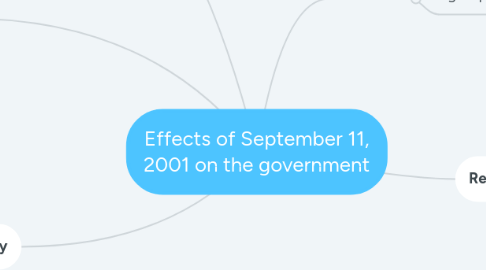
1. The USA Patriot Act of 2001gave the federal government more power to find international terrorists.
1.1. This was a compromise between the Senate and House Bills. This act made changes to existing laws regarding privacy of telephone and electronic conversations.
2. New Security
2.1. The Department of Homeland Security is to protect the United States from terrorists attacks.
2.1.1. The agencies Homeland Security Controlled: The Coast Guard, Secret Service, The Federal Emergency Management, U.S Customs and Border Protection, Immigration and Naturalization Services, and The Transportation Security Administration.
2.1.1.1. The Transportation Security Administration was an agency controlled by a The Department Of Homeland Security. It has to do with protection through transportations and better security.
2.1.1.2. Cyber Security is the protection of computers and their networks. The federal government has put policies designed to help to cyber security and help minimize threats though electronics that can cause damage.
3. Example of domestic terrorism: Oklahoma City Bombing
3.1. The Oklahoma City Bombing killed 168 people. A rental truck packed with exlplosives was parked outside the Alfred P. Murrah Federal Building. The truck exploded and almost brought done the whole building.
3.1.1. Timothy McVeigh was charged as a suspect and his army buddy shortly surreandered shortly after. Neither of them were connected to a major political group but both shared extreme views.
4. Event:
4.1. September 11 attacks were a series of four terrorist attacks by an Islamic terrorist group that targeted the United States
4.1.1. Perpetrator: al-Queda is an Islamic militant organization founded by Osama Bin- Laden. It was originally formed to support extremist Muslims in Afghanistan. They used terrorism and political intimidation.
4.1.1.1. Definition of Terrorism: Terrorism is the use of to achieve political goals by creating fear.
5. Response to Terrorism
5.1. On September 20, 2001, President George W. Bush announced the country would begin a war on international terrorism also known as the War on Terror. He asked that all governments turn over any terrorists they might be sheltering.
5.1.1. George W. Bush is the 43rd president of the United States and he led the nation after the worst terrorist attack in history. After the attacks on September 11, Bush changed approach to foreign policy and national security.

